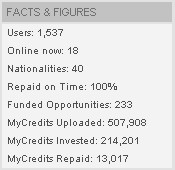More and more p2p lending services are launching, each catering to different markets and different target audiences. Some derive more features from "ancestors" Prosper or Zopa, some less.
All follow the aim to allow lenders to directly lend money to borrowers without a bank acting as intermediary. This aim is sometimes not pursued strictly to the point. Smava actually partnered with a bank to comply with regulation, Zopa US partnered with credit unions, but nevertheless it serves as comprehensive definition.
Dividing p2p lending services in categories could follow several possible factors:
- price building mechanism (auction/non-auction; interest set by platform/by borrower/by lender)
- purpose of loan (private/business/both)
- social lending vs. lending for profit
I think the last factor is most useful for the definition of categories. It affects all parts of the service from marketing to operations. The differentiation is in the objective the majority of the lenders had when selecting the platform. Were they attracted by the motivation to help an individual through a loan or by the motivation to earn interest? Continue reading


 Today a new
Today a new  Today the
Today the